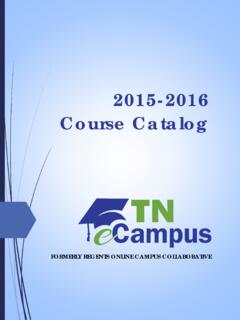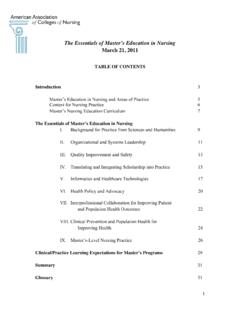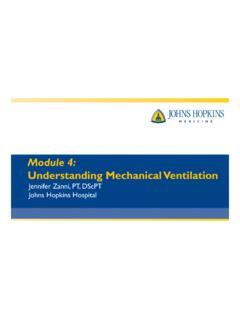Transcription of The Essentials of Master's Education in Nursing
1 American Association of Colleges of Nursing The Essentials of Master's Education in Nursing March 21,2011 TABLE OF CONTENTS Introduction 3 Master's Education in Nursing and Areas of Practice 5 Context for Nursing Practice 6 Master's Nursing Education Curriculum 7 The Essentials of Master's Education in Nursing I. Background for Practice from Sciences and Humanities 9 II. Organizational and Systems Leadership II Ill. Quality Improvement and Safety 13 IV. Translating and Integrating Scholarship into Practice 15 V.
2 Informatics and Healthcare Technologies 17 VI. Health Policy and Advocacy 20 VII. Interprofessional Collaboration for Improving Patient and Population Health Outcomes 22 VIII. Clinical Prevention and Population Health for Improving Health 24 IX. Master's -Level Nursing Practice 26 Clinical/Practice Learning Expectations for Master's Programs 29 Summary 31 Glossary 31 1 References 40 Appendix A: Task Force on the Essentials of Master's Education in Nursing 49 Appendix B: Participants who attended Stakeholder Meetings 50 Appendix C: Schools of Nursing that Participated in the Regional Meetings or Provided Feedback 52 Appendix D: Professional Organizations that Participated in the Regional Meetings or Provided Feedback 63 Appendix E.
3 Healthcare Systems that Participated in the Regional Meetings 64 2 The Essentials of Master's Education in Nursing March 21, 2011 The Essentials of Master's Education in Nursing reflect the profession's continuing call for imagination, transformative thinking, and evolutionmy change in graduate Education . The extraordinmy explosion of knowledge, expanding technologies, increasing diversity, and global health challenges produce a dynamic environment for Nursing and amplify Nursing 's critical contributions to health care . Master's Education prepares nurses for flexible leadership and critical action within complex, changing systems, including health, educational, and organizational systems.
4 Master's Education equips nurses with valuable knowledge and skills to lead change, promote health, and elevate care in various roles and settings. Synergy with these Essentials , current and future healthcare reform legislation, and the action-oriented recommendations of the Initiative on the Future of Nursing (!OM, 2010) highlights the value and transforming potential of the Nursing profession. These Essentials are core for all Master's programs in Nursing and provide the necessary curricular elements and framework, regardless of focus, major, or intended practice setting.
5 These Essentials delineate the outcomes expected of all graduates of Master's Nursing programs. These Essentials are not prescriptive directives on the design of programs. Consistent with the Baccalaureate and Doctorate of Nursing Practice Essentials , this document does not address preparation for specific roles, which may change and emerge over time. These Essentials also provide guidance for Master's programs during a time when preparation for specialty advanced Nursing practice is transitioning to the doctoral level. Master's Education remains a critical component of the Nursing Education trajectory to prepare nurses who can address the gaps resulting from growing healthcare needs.
6 Nurses who obtain the competencies outlined in these Essentials have significant value for current and emerging roles in healthcare delivety and design through advanced Nursing knowledge and higher level leadership skills for improving health outcomes. For some nurses, Master's Education equips them with a fulfilling lifetime expression of their mastery area. For others, this core is a graduate foundation for doctoral Education . Each preparation is valued. Introduction The dynamic nature of the healthcare delivery system underscores the need for the Nursing profession to look to the future and anticipate the healthcare needs for which nurses must be prepared to address.
7 The complexities of health and Nursing care today make expanded Nursing knowledge a necessity in contemporary care settings. The transformation of health care and Nursing practice requires a new conceptualization of Master's Education . Master's Education must prepare the graduate to: Lead change to improve quality outcomes, 3 Advance a culture of excellence through lifelong learning, Build and lead collaborative interprofessional care teams, Navigate and integrate care services across the healthcare system, Design innovative Nursing practices, and Translate evidence into practice.
8 Graduates of Master's degree programs in Nursing are prepared with broad knowledge and practice expertise that builds and expands on baccalaureate or entry-level Nursing practice. This preparation provides graduates with a fuller understanding of the discipline of Nursing in order to engage in higher level practice and leadership in a variety of settings and commit to lifelong learning. For those nurses seeking a terminal degree, the highest level of preparation within the discipline, the new conceptualization for Master's Education will allow for seamless movement into a research or practice-focused doctoral program (AACN, 2006, 2010).
9 The nine Essentials addressed in this document delineate the knowledge and skills that all nurses prepared in Master's Nursing programs acquire. These Essentials guide the preparation of graduates for diverse areas of practice in any healthcare setting. essential I: Background for Practice from Sciences and Humanities o Recognizes that the Master's -prepared nurse integrates scientific findings from Nursing , biopsychosocial fields, genetics, public health, quality improvement, and organizational sciences for the continual improvement of Nursing care across diverse settings.
10 essential II: Organizational and Systems Leadership o Recognizes that organizational and systems leadership are critical to the promotion of high quality and safe patient care . Leadership skills are needed that emphasize ethical and critical decision making, effective working relationships, and a systems-perspective. essential III: Quality Improvement and Safety o Recognizes that a Master's -prepared nurse must be a11iculate in the methods, tools, performance measures, and standards related to quality, as well as prepared to apply quality principles within an organization.



